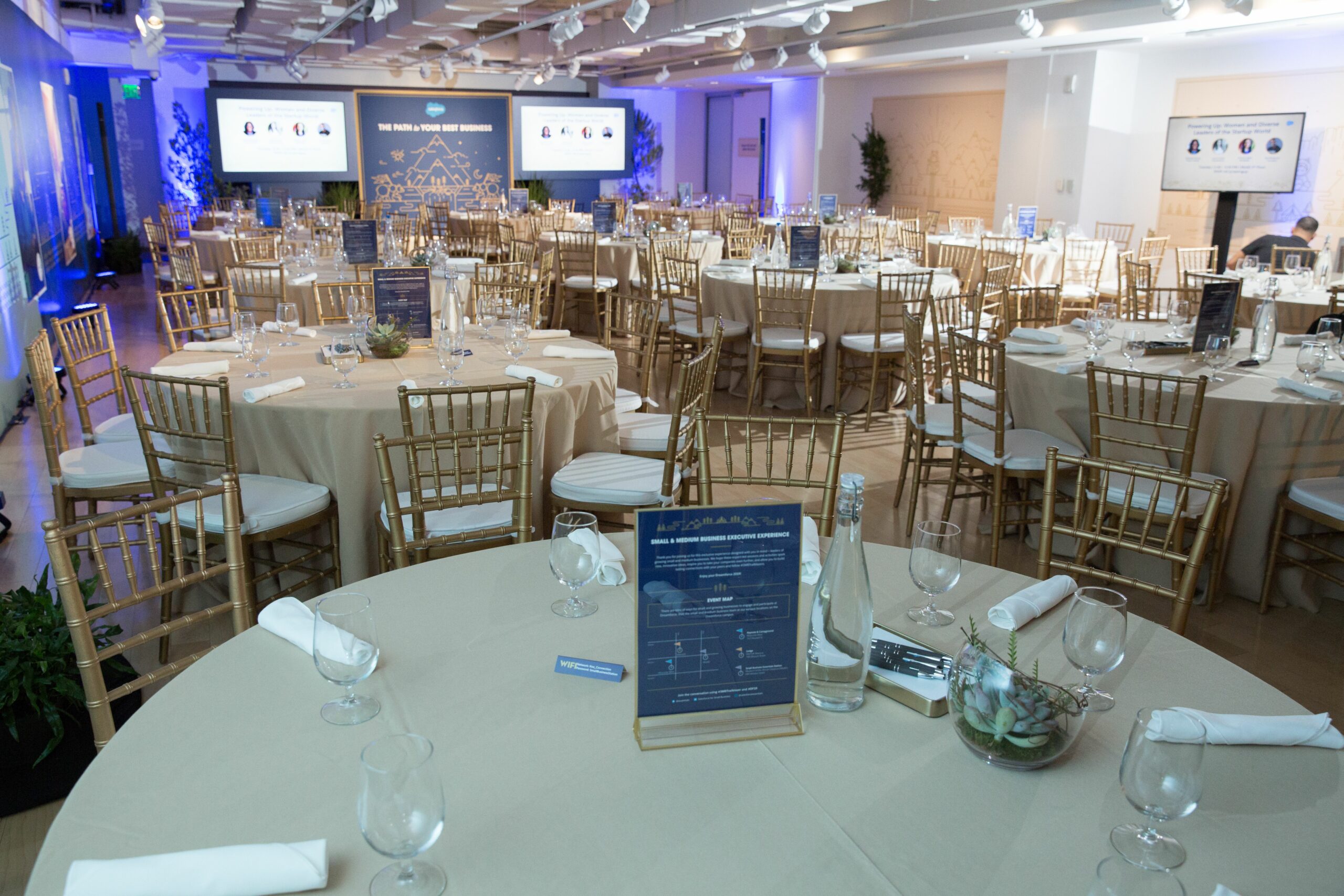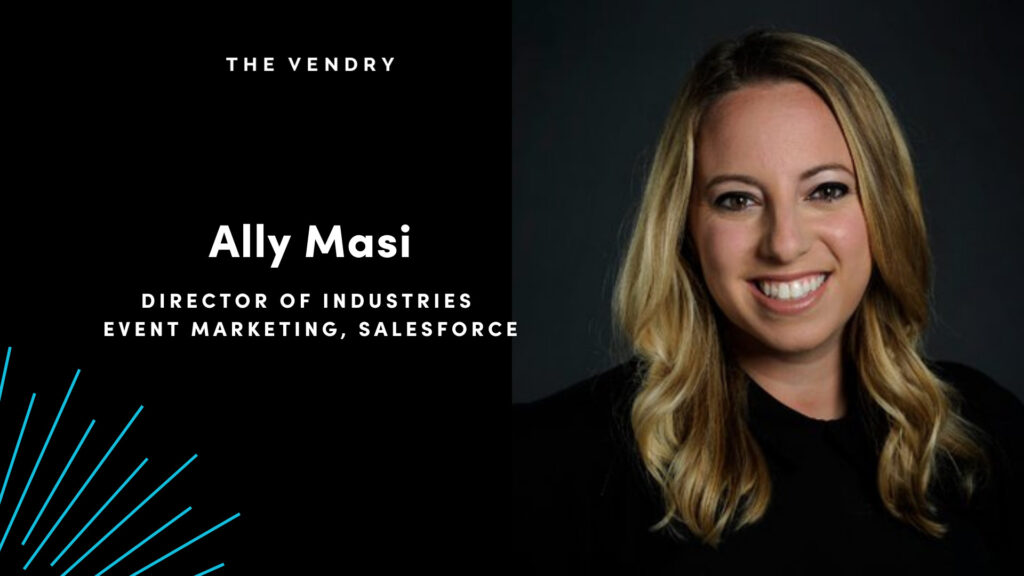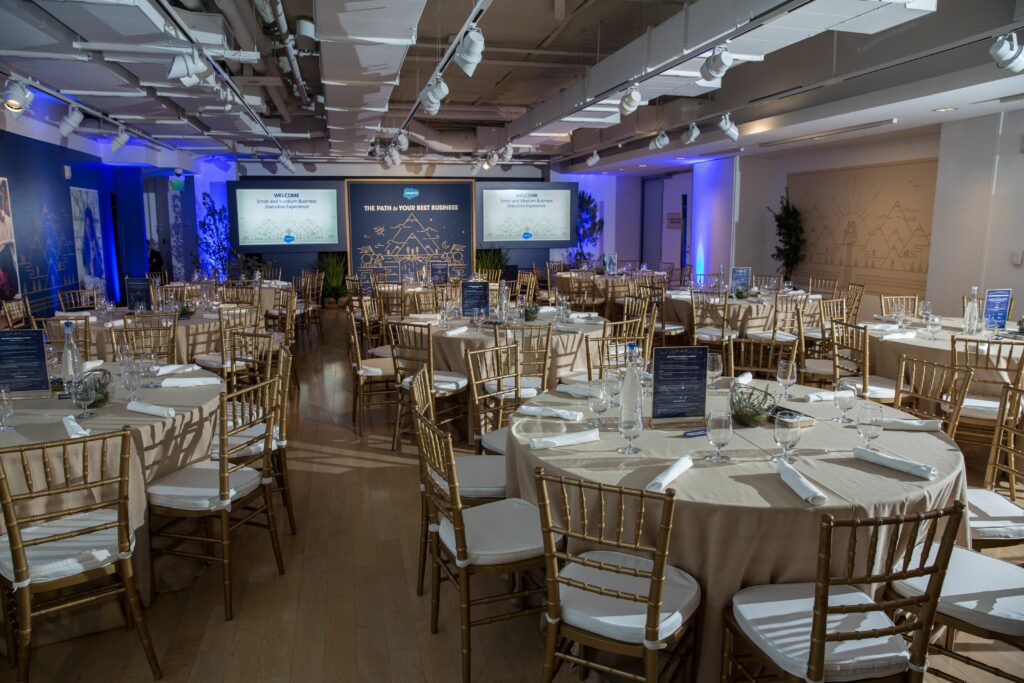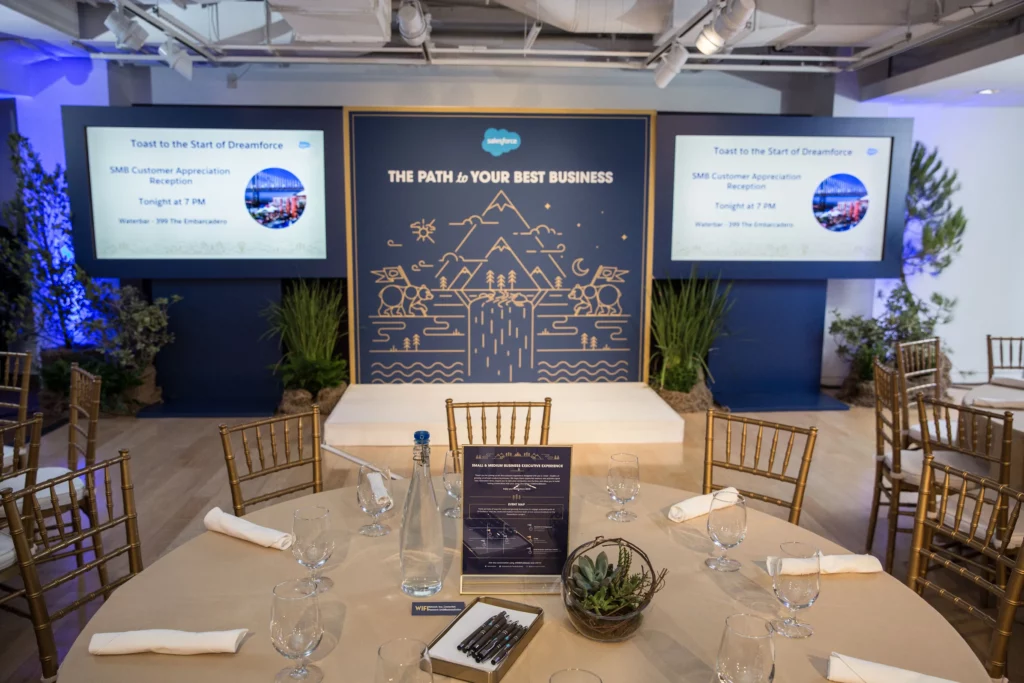
Ally Masi is the Director of Industries Event Marketing at Salesforce, where she recently took on a new role earlier this year, transitioning from SMB executive events to industries events. The New Jersey-based industry pro chatted with The Vendry about microinnovations the strategy behind a recent virtual summit, and how her childhood birthday parties inspired her career.

I lead a team of three amazing event marketers at Salesforce, focusing on our top industry verticals including financial services, health and life sciences, manufacturing, retail and consumer goods, and comms and media. Along with our broader team, we responsible for managing any third-party event presence at major events that fall within those industries, and also managing the industries content that shows up at our own events like the big Salesforce tentpole events such as Dreamforce, Connections, and World Tours. We work hand in hand with our product marketing team to make sure that the right content is front and center at those events for customers based on industry trends and what's happening in the product lifecycle.
Prior to this, I managed our small and medium business executive events, working with VP and C-level customers from small and medium businesses, which we define as having one to 200 employees, and bringing them together for peer-to-peer exchange, networking, and thought leadership.
I look for inspiration everywhere and anywhere! Believe it or not, I was recently inspired by my toddler’s first visit to the dentist (read my blog post on that here!) I’m a very visual person, so some of my biggest sources of inspiration are social media, following trends in the hospitality space (i.e. travel, dining), and attending events myself, which I’m excited to get back to doing in person. Being in the B-to-B space, I think it’s also important to look at what's happening in the B-to-C world that is relevant and thinking about how we can we turn that into more of a B-to-B engagement.
One of the biggest sources of inspiration is Priya Parker’s work. I’m a huge fan of The Art of Gathering and her podcast and all of her articles. She really has a unique perspective on how gatherings facilitate human-to-human connection and why these events matter. It has become so relevant during the pandemic, this thing that we all take for granted, gathering together. But we can't go back to how it was before.
I think my creativity is one of my biggest strengths. And it’s not necessarily always creativity on a large scale, but finding little ways to innovate — whether it’s a process, or a way to create an extra layer of event magic, or surprise moments of connection between people. My team and I like to call these microinnovations. I constantly encourage my team to test new concepts. If they have ideas backed by data and rationale and it doesn’t work, we learn and move on!
People also tell me that I'm calm, which is always a surprise to me because I feel in my head like I’m going a million miles a minute trying to problem-solve on the fly but somehow I don’t show that. I love being challenged to solve a problem in the moment — I think that’s another form of creativity. How do you use the resources you have on hand to make it work.
For Salesforce, Dreamforce is the biggest event of the year. There's a ton of content and programming to the point where you're almost competing against yourself for mindshare. Prior to the pandemic, our invite-only executive track for SMB leaders was of course in person, so we had to figure out how to innovate that on virtual. The first year went really well because we had an awesome platform, strong content, and people were still new enough to that world of virtual events that they weren't totally exhausted by it yet. Going into Dreamforce 2021 we definitely saw virtual attendance was on the decline overall. We had to continue to think of creative ways to engage people. How do you make this not just another virtual conference or Zoom roundtable?
We ended up working with a couple of different partners, and created a Spontaneous Think TankTM where we had our customers build the agenda and volunteer to lead breakouts in real time, so we knew we were talking about what was important to them in that moment. The conversation was fully driven by the customers and not by us setting the agenda. It was received really, really well to the point that a few different people said it was the closest thing to being back to in person that they’d ever felt from a virtual event, which I think was like the holy grail of event feedback in year two of the pandemic. [Read more about the strategy and technology that the Salesforce SMB team used during the event via this LinkedIn post.]

Going back to what Priya Parker teaches, you really need to understand the why and challenge the ritual behind it. Why are you doing this? What's different about this point in time? What will serve your guests right now? And not repeating events because they've worked in the past. Once you understand that, understand what people need, being able to craft those points of connection that are going to leave people walking away feeling like that was really, really valuable and worth my time.
Now that we're going back to in person trying to understand what's new, what's changed. There's so much change in the events and hospitality space. What makes a venue unique? Is there a minority-owned venue? What about sustainability? Do they offer a really cool experience beyond just a dinner? Is there some kind of engagement with the chef to take the experience up a notch? I haven't seen it done better than what The Vendry provides in being able to filter for this type of information.

When it comes to event partners or agencies, I have a few go-to’s but also rely heavily on word of mouth from my peers. Building relationships is so important — I’ve been a member of various formal and informal networking groups with other event professionals, including International Live Events Association, The Vendry’s networking groups, Splash circles, the Haute community and more. It’s great to tap into these groups for inspiration and trusted recommendations on suppliers.
My mom threw the best birthday parties for me and my sister. She would take party planning books out of the library (it was before Pinterest after all!) and find the most creative ideas, and every detail was thought through. That was something that I always remembered and cherished from my childhood and is a big part of why I do what I do today. Then, in high school and college, I was involved in a lot of organizations where there were events and I naturally gravitated toward it. Being very detail oriented, I love the planning, but also the ability to create something brand new or uplevel something that already existed. I started a fundraising event at my high school in 2005 that is still going strong today - 17 years later. The current students even had virtual versions of it the past 2 years!
In college, I was also really into writing and journalism and thought my career would go in that direction. I ended up in public relations instead of news journalism. I'm really glad I did because there's a natural event aspect to PR that allowed me to stay plugged into my love of events. I worked at a PR agency for eight years before coming to Salesforce, and within that moved from generalist public relations into specializing in events for our clients into owning our business development events for the agency itself. That whole breadth of experience gave me really good insight into not just the event logistics, but the metrics, the goals, the bigger campaign behind the event, which prepared me for my role at Salesforce.
Expand your network. Expand your circle.
Apply to Circles - our exclusive, curated networking groups for top event professionals.
Communication and writing is something that’s so important regardless of what type of marketing you're in. It's something that's often overlooked in event marketing. There's so much noise, especially in the virtual world, you have to communicate why people should attend your events and also be able to, on a broader level, communicate back to your stakeholders the value. I think having a really great foundation in writing and communications is super important.
I think it's really important to know what part of events excites you. Unless they're in the industry, it's easy for peopel to think 'oh, it's a singular job.' But there are so many areas of expertise you can hone when it comes to events — whether it’s logistics, the technical side, content and thought leadership, event operations — and now a whole other set of skills that have expanded with virtual events. So think about what you like about events and what skills, what background you have that's related and how you can use that to get to where you want to be.
In my previous role, I did a lot of programming for SXSW and love Austin.
A nice massage is amazing after being on your feet at events.
Have a beginner's mindset. That advice is very common at Salesforce. But I think even before being here it's something that has gotten me far in my career. Always approaching with curiosity, and questioning the way things have been done as you would if you were a beginner.